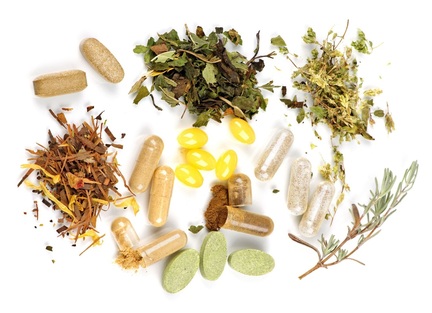| When anxiety starts to rise in your body, it can feel like the world is closing in on you. Your breath comes in short gulps, your pulse speeds up, and your mind starts to race. Whether your anxiety is a rare visitor who only shows up when you’ve got an important meeting in the morning, or a more consistent companion that’s been with you for years, there are natural herbal therapies that are safe, effective and non-habit forming. Of course, lifestyle practices like conscious breathing, exercise, and ensuring that you’re eating a mineral-rich diet can make a big difference in dealing with anxiety. But when I was struggling with severe anxiety, it could seem like those common suggestions didn’t even put a dent in my suffering. My clients tell me similar stories. “I really don’t want to take medication,” they say, “because I know a lot of the anti-anxiety meds are addictive.” Then they sit for a moment and confess, “But it really feels like I need more than just the breathing exercises.” The good news is that there are lots of wonderful herbs that are strongly effective against anxiety, and they don’t share the same risk of addiction and dependence that come with pharmaceutical anti-anxiety medications like benzodiazepines. Like all medicinals, these herbs aren’t right for everyone, but they can be tremendously helpful when they’re used at the correct dose and are correctly matched to your needs. Here’s the lowdown on three herbs that can help you dance more gracefully with anxiety. It’s important to remember that herbs aren’t like drugs; there’s no “anxiety herb.” You’re looking for the herb that’s the best match for you. Avoid taking any of these herbs (unless otherwise directed by a qualified practitioner) if you’re taking prescription medication for sleep, anxiety, or depression, or if you’re taking blood thinners like Coumadin or Warfarin 1. Skullcap (Scutellaria lateriflora) Skullcap is the anxiety remedy for people who experience anxiety along with restlessness, muscle tension, and jaw clenching. If you tend to toss and turn in bed, or if you feel like you can only relax when you’re out walking (but sitting still makes you want to jump out of your skin), or if you feel like “climbing the walls” when you’re stuck inside during a bout of anxiety, skullcap can help you to unwind not only your anxiety, but also the accompanying muscular tension and restlessness. Skullcap is effective in tea or tincture (a tincture is an herb extracted in alcohol) form, but if you can tolerate small amounts of alcohol I think 20-40 drops of the tincture (for a 150-pound person) is the most effective form. | 2. Passionflower (Passiflora incarnata) Often mistaken for an aphrodisiac because of its seductive name, passionflower is actually the remedy for people who are so burned out and exhausted that all that’s left is anxiety. This is the remedy for people who give and give until they have nothing left for themselves. The tips of their tongues are usually bright red, and they feel a sense of being exhausted but unable to rest because the thoughts in their head keep spinning out of control. They may have heart palpitations or a racing heartbeat during bouts of anxiety. This plant is effective in both tea and tincture form, but like skullcap, I tend to prefer tinctures for anxiety remedies because they’re easy to use and ready in an instant. Use 20-40 drops of tincture in a little bit of water (for a 150-pound person) and increase the dose by 10 drops at a time if you don’t feel relief after 15 minutes. 3. Kava kava (Piper methysticum) Kava kava is the most famous anti-anxiety herb, and with good reason. It’s a powerful remedy that’s been shown to be effective in reducing anxiety, as compared to a placebo. Kava kava is more sedating and hypnotic than passionflower and skullcap, and some people find that it creates a blissed-out feeling. It has an intriguing taste that almost numbs your mouth, and has a long tradition of ritual use in Polynesia as well as medicinal use for its sedative and pain-relieving properties. In recent years there’s been some research to suggest that over-consumption of kava kava may damage the liver, so I caution clients not to use this herb if they have liver problems, if they consume alcohol regularly, or concurrently with acetaminophen. That said, there is a very long history of safe use of this herb, so as long as you don’t have any liver issues, you can feel confident using this herb up to 3-4 times per week to help relieve your anxiety. It’s effective as a tea, tincture, or capsule, but I think tea or tincture is best. Remember, these herbs are helpers on your journey to healing your anxiety. All of your other lifestyle practices, like breath work, exercise, journal writing, a healthy diet, and reaching out for support from friends, family, and practitioners are still important — but there’s no question that life with anxiety is a lot easier with safe and effective herbal remedies in your back pocket. By Melanie St. Ours Full article can be found here: http://www.mindbodygreen.com/0-10481/3-herbs-to-relieve-anxiety.html |
sat nam xo, b


 RSS Feed
RSS Feed
